
May is a month of prayer with the National Day of Prayer and Thy Kingdom come in two weeks Not to be forgotten is Julian of Norwich who was one of the first women authors.
“Pray, even if you feel nothing, see nothing. For when you are dry, empty, sick or weak, at such a time is your prayer most pleasing to God, even though you may find little joy in it. This is true of all believing prayer.” Julian of Norwich
Julian of Norwich was a 14th century mystic and writer. Julian’s book, Revelations of Divine Love is based on a series of sixteen visions she received on the 8th of May 1373. That’s 651 years ago today May 8, 2024. She became one of the first known female writers and one of the first published writers.
We also know her by her famous quote “All shall be well, and all shall be well, and all manner of things shall be well.” We celebrate her day on May 8, 2023.
At the age of thirty, stricken by a grave illness and believed she was on her deathbed. She was living at the time of the Black Death. (Records indicate half the population died during the plaque). She hints that at this time she had nothing to live for and so she welcomed death.
The medical crisis passed, and she had a series of fifteen visions, or “showings,” in which she was led to contemplate the Passion of Christ. These brought her great peace and joy. In her “showings,” Christ revealed his bleeding and his dying as acts of unconditional love. Her concept of Christ changed over her life from a God of wrath to one warm and welcoming.
The experience transformed her life. She became an anchoress (one who lived a life prayer and contemplation), living in a small hut near to the church in Norwich, England where she devoted the rest of her life to prayer and contemplation of the meaning of her visions.”
It is worth pointing out that Julian of Norwich was not a hermit. Even though she spent more than forty years living in a small cell attached to a church, she had a window that looked out onto the busy city street of Norwich. From this window she offered spiritual guidance to her community. She kept tabs on neighborhood news and soothed broken hearts. She accepted loaves of fresh baked bread and shared honey from the hives she kept. She was simultaneously protected from the world and connected to her community.
There were no barriers for Julian with Christ. She talks of the “glorious mingling” of body and soul, matter and spirit. She insists on the marriage of nature and God, on panentheism as the very meaning of faith, and on the marriage of God and the human (for we, too, are part of nature): “between God and the human there is no between.”
Here is a podcast about her from Christianity Today – “In this episode of Prayer amid Pandemic, Amy Laura Hall, the author of Laughing at the Devil: Seeing the World with Julian of Norwich and a Christian ethics professor at Duke Divinity School, tell us why we know so little about Julian’s identity but why we still read her writings on the vision she received while sick today.”
Bulletin, Easter 5, May 7, 2023
Click here to view in a new window.
Voices, Easter 5
Lectionary for this week
John’s Gospel only
1. Ruth Frey, Trinity Episcopal, NY – “Jesus offers no roadmap but a relationship”
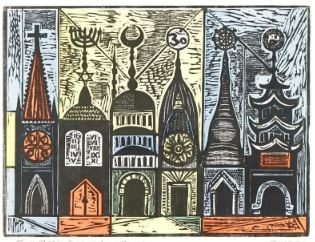
Jesus tells the disciples, “Do not let your hearts be troubled,” and that he will prepare a place for them — for us. In this Gospel passage, Jesus is emphasizing that all we need is our relationship with him. All that Jesus is and has done shows us who God is. And yet, he says that no one can come to the Father except through him. What about our Jewish and Muslim siblings? And of those of other faiths? In this response to Thomas’ question “How we will know the way?” Jesus offers reassurance that he will always be with us as the way, truth, and life. It isn’t a commentary on other faiths or beliefs — especially Judaism, as Jesus and the disciples were Jews!
And Jesus goes on to say that anything asked in his name, he will do. How many of us have prayed fervently and our prayer seems to be unanswered? But maybe we are called to see the work that God is already doing in the world around us. Wherever there is healing, reconciliation, and hope, God is at work. Maybe we are more a part of this than we recognize.
Jesus offers no roadmap but a relationship. And as with any relationship, it is ongoing and ever evolving. We are always invited to get to know Jesus more deeply. We invite him to know us in all our troubles, sorrows, and joys. And we participate with him in bringing God’s healing and hope to the world around us.
I am the Way – Salt’s Commentary for Easter 5
Big Picture:
1) This is the fifth of the seven weeks of Eastertide. Between now and Pentecost, we’ll continue exploring Jesus’ teachings on faith and intimacy with God.
2) This week’s reading from the Gospel of John includes one of the most famous — and infamous — verses in the New Testament: Jesus’ remark that “No one comes to the Father except through me” (John 14:6). Too often, this sentence is distorted into a dogma of exclusion, as if Jesus is saying, If you’re not Christian, you’re damned. As we’ll see, this is a drastic misunderstanding of what Jesus is actually up to in this story.
3) What’s he up to? He’s trying to reassure his anxious, heartbroken disciples. Why are they anxious and heartbroken? Jesus has just delivered a devastating one-two punch: first, the news that “I am with you only a little longer” and “Where I am going, you cannot come” (John 13:33); and second, that Peter — and by extension, the whole group — will deny and desert him in his imminent hour of need (John 13:38). For the disciples, worse news could scarcely be imagined. They’re stunned, and beginning to panic — and at precisely this moment, this week’s passage begins.
4) The larger context is John’s version of the Last Supper (John 13-17). John doesn’t include the Eucharist in his narrative, instead focusing on how Jesus washes the disciples feet and then delivers the so-called “farewell discourses” — basically his last words of guidance and consolation for his followers as he takes his leave. The broad strokes in this section of John, then, are that Jesus is on his way out, the Holy Spirit is on her way in (as we’ll see in next week’s reading; see John 14:15-26), and the post-Easter church is about to be born, a community that, Jesus insists, will go on to do even “greater works” than he did (John 14:12). Christians tend to valorize Jesus’ time “in the flesh” — but for John, the symphony of salvation continues to crescendo with each movement, and the rise of the Spirited-church-abiding-in-Jesus is an even “greater” phase of God’s redemptive work.
Scripture:
1) The disciples are distraught — and understandably so! Think of it: from their point of view, here is the Messiah, the one they believed would deliver them and the whole world, the one on whom they had pinned all their hopes, all their lives — and now he’s leaving? Not only leaving — now he’s going to suffer, to be humiliated, desecrated, vanquished? And his disgrace — in the end, wouldn’t it amount to their disgrace as well? No wonder they’re disoriented, wide-eyed, and afraid. Thomas says out loud what they’re all thinking: “How can we know the way?” (John 14:5).
2) This context of crisis and desperation is the interpretive key for understanding what happens next. Jesus’ response, so far from a cerebral, scolding lecture on salvation or “who will get to heaven,” is actually an exercise in urgent, poignant pastoral care. He’s assuring his companions that his imminent departure is not abandonment, but rather a move that will make way for an even deeper intimacy. It’s as if he’s saying, On one level, I’m about to leave you — but on a deeper level, we’ll be closer than ever. Don’t worry. Take heart. Trust me — and trust the One who sent me!
3) Thomas asks, “How can we know the way?,” and Philip follows up by asking Jesus to “show us the Father” — as if to say, At least give us some coordinates, so we can find our way to “God’s house” once you’re gone (John 14:5,8,2). Jesus’ response amounts to this: You already know the Way! You know the Way we’ve been traveling, the Truth we’ve been learning, the Life we’ve been living — so just keep going, and when you do, I’ll be right there with you, because I am the Way, the Truth, and the Life. I’m not merely your ‘guide’; I am the Way. So keep going and learning and living toward God, and we’ll be together as you go…
4) Remember, the Gospel of John begins by identifying Jesus with the divine Logos, the life-giving divine Word, Thought, Reason, Pattern (all legitimate translations of the Greek word, logos) underneath and at the heart of everything. For John, by living in and through this Pattern, by walking in and through this Way, we live and walk in communion with the One who, in the beginning, was with God and was God (John 1:1-5).
5) In other words, Jesus insists that even though he’s leaving, his followers’ everyday lives of living out his teachings — especially the new commandment he’s just given, to “love one another as I have loved you” — will be sure signs of their ongoing communion with him. The tone of this teaching, then, isn’t stern admonition; he’s not saying, If you want me to be with you, you’d better follow my instruction (much less, If you want salvation, you’d better be a Christian!). On the contrary, his tone is tender-hearted, since his aim is to console and assure his friends: Don’t worry. Just keep following my instruction, walking in the Way — and I’ll be with you. In fact, our companionship will be even closer than it is now. Today we walk side by side — but in the days to come I will live in you, and you in me. Today, you walk in my footsteps — but in the days to come you will walk, so to speak, ‘in my feet,‘ and I will walk in yours. You will be my body, my hands and feet and word for a world that needs healing and justice and good news. You see? I’m not abandoning you. On the contrary, I will abide in you, and you will abide in me (John 15:4). I will not leave you orphaned! (John 14:18).
6) The upshot of all this — Keep going in the Way, and we’ll be together, closer than ever! — is that Jesus wants to leave his disciples with a profound sense of confidence and equanimity: in a word, “peace” (John 14:27). John writes in Greek, of course, but in the background here is the ancient Hebrew notion of shalom — not just the absence of conflict, but the vibrant presence of personal and communal well-being. My peace I give to you, Jesus says near the end of this chapter, a sentiment he’ll repeat when he appears to the disciples after his passion and resurrection (John 14:27; 20:19,21,26).
Easter 5 – Many Rooms – Jan L. Richardson

"Many Rooms" -Jan L. Richardson
From the Painted Prayerbook by Jan L. Richardson
"Many years ago, a recurring dream began to take hold of my nighttime brain. The details shift and change each time it visits, but the essence of the dream remains the same: I am wandering through shops—not a mall, but a series of connected stores. The stores are the kind that I love to browse through, the sort that I find in communities that value artistry. As I wander among the stores that spill into one another, I savor what I see: richly hued artwork, finely crafted jewelry, beautiful pottery that calls out for me to touch it.
"In the dream, no matter the changing details, I always find a bookstore. Often it’s a used bookstore, crammed with volumes and with more shelves around each turn. Once the bookstore contained a case of gorgeous hand-bound books, displayed like artwork. I marveled at the colors, textures, and designs, knowing as I touched the books, I want to do this, to create books like these.
"Along with the persistent presence of a bookstore, one other detail of the dream never changes: it always begins with my walking down a familiar street. I turn a corner and suddenly find myself among the shops, thinking, Of course—that’s where they were! These treasures were in my neighborhood the whole time, waiting for me to find them.
"And you know the way to the place where I am going, Jesus says to his disciples on the night before his death. Here at the table where they share their final meal before his crucifixion, there are many things Jesus wants to tell them. His hunger for them to know—which we see again and again in the gospel texts in this Easter season—becomes particularly acute as Jesus gathers with them just hours before his death. And so he will go on to tell them about the Holy Spirit whom he will send, and how this Spirit will be in them. Jesus will tell them that he is the true vine in which they will abide. He will tell them—command them—to love one another, and how the world will hate them. He will tell them that their sorrow will turn to joy. Jesus is desperate for them to know these things, and more.
"But when he tells them, before all this, of the place he is preparing for them—the house with many dwelling places—Jesus tells them that they already know the way. When Thomas—ever the good questioner—asks him how they can know the way, Jesus reminds them that he himself is the way. If they know him, they know the way, and the One who sent him to prepare the way for them.
"This text has me wondering if following in this way has less to do with striving and working at it, in the frenetic fashion we sometimes do, than with letting ourselves recognize what we already know; less to do with wrapping our brains around points of belief that grow so contentious than with opening our eyes to the door that has always been there in our soul, our heart, waiting for us to see it and walk through it and find the spacious dwelling place that has been there all along. To be sure, following Christ our Way takes work and effort and focus and sacrifice. Yet I find myself thinking of the poem by the Sufi poet Rumi in which he writes of how he has been living on the “lip of insanity,” as he puts it, knocking incessantly on a door. Finally the door opens, and he realizes, “I’ve been knocking from the inside!”
"Here at the table, Jesus wants to make clear that although the place he describes is a someday place, a promised home that he is preparing, it is at the same time a dwelling that his followers can have a glimpse of in this world, a space that even now takes form in our midst. An abiding-place fashioned by—and fashioned of—the Christ who dwells in God, and is a dwelling place for God, and offers his own self to us as both a habitation and a way. A way that we find by opening the door that is already within us.
"In this season, where are you making your home? Where are you dwelling? Is there a place in your life where you are pushing and pouring out your energy—something you are trying to wrap your brain around to understand it or to change it—when the way might lie instead in releasing, in finding the doorway that appears in letting go?"
Sunday links, Easter 5, May 7, 2023
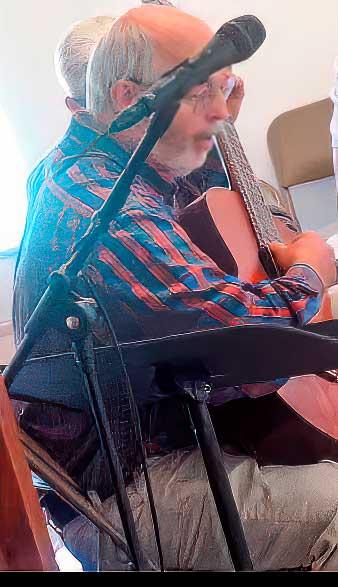
Larry Saylor’s offertory April 30, 2023
Coming up!
Dispose of sensitive documents safely and securely, and free up needed space at home or work.
Shred-it, May 19, an Essential Ministry
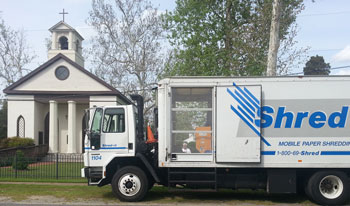

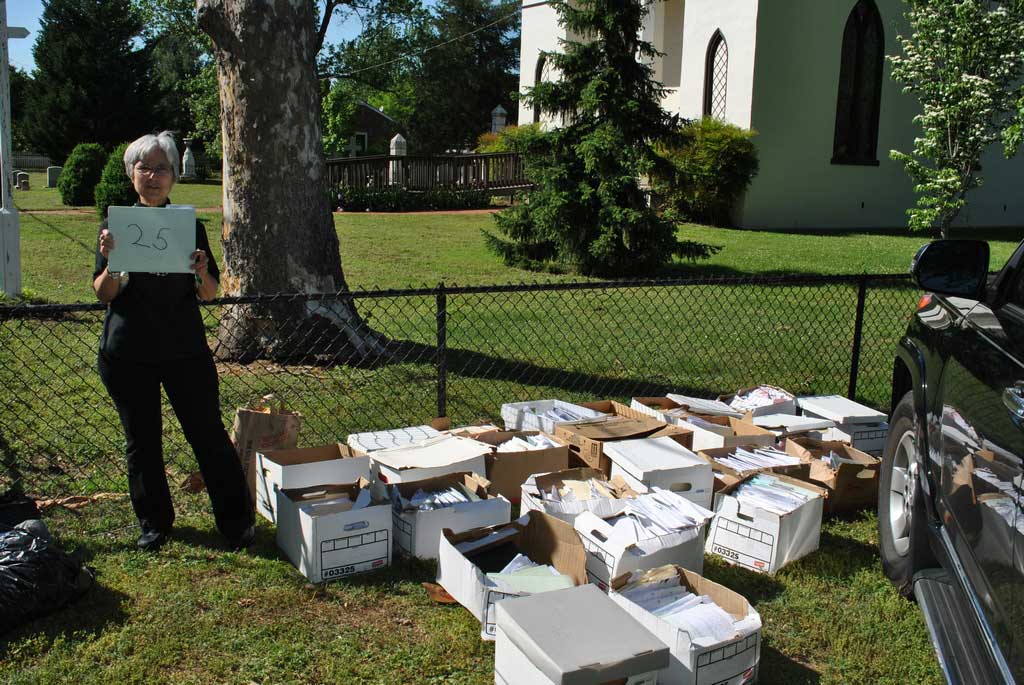

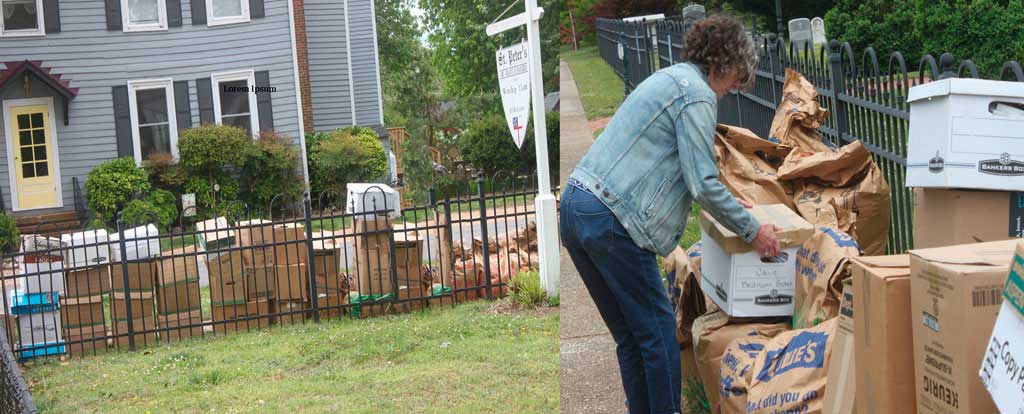
Above – From Left to right, top to bottom – 2013, 2015, 2017, 2019, 2022
Please note the change of date from Wed, May 10 to Fri, May 19
Shred-it is an essential ministry because it involves a number of people around a common necessary task that is best accomplished by professionals.
Shred-it’s goal is to safely dispose of records no longer needed. It may be old Tax returns, bank statements, investment records, any expired document etc. They lie around gathering dust and may contain personal information that needs to be kept secured even if the records are no longer pertinent or useful. For obvious reasons we don’t want to put them in the regular trash or even recycling bin.
There is also the environmental benefit for having these documents shred rather than lying in some landfill. We don’t need any more paper cluttering our lives!
Shred-it is a fellowship event as well that goes beyond the church. It is a community event We get to see people who come around once a year from the community. We might ask “What’s new ? How has your life changed over the year ? Have you seen so and so from the neighborhood” and then .”Thanks for contributing to St. Peter’s ministries.” Andrea usually had food to encourage the fellowship.
It is also a time to remember those no longer part of our lives whether due to relocation, sickness, death or some other reason. It is another event that is part of the scrapbook of our lives.
It is also a fundraiser for our outreach ministries. We have netted $2,570 over the last 10 years for outreach ministries.

Finally, Shred-it is another opportunity to thank Andrea Pogue who came up with the idea and has organized it since. For all these reasons here it is a great ministry!
So I am encouraging you to check your valuable records, stuff that needs to go that you don’t want to entrust with your regular garbage or recycling services and plan to bring it to St. Peter’s on May 10 to let the professionals dispose of it securely. Publicize it to your friends!
Visual Lectionary Vanderbilt – Easter 5, May 7, 2023
Click here to view in a new window.
John 14:1-14 – “Jesus is the dam that holds us when the levee breaks.”
From “Christian Century” – Jared E. Alcántara

“…In times of quiet desperation, Jesus says to us what he says to his disciples: I will be the dam that holds you when the levee breaks, the tunnel that brings you through to the other side when you’re stirred up, unsettled, thrown into confusion. Do not let your hearts be troubled. Trust in God. Trust also in me.
“The disciples need to hear this. Jesus has just told them he will be with them “only a little longer.” Now he tells them he’s leaving. He will come back to get them but has to leave them first. They don’t need to worry, though. They already know the way.
“Thomas asks the same question that is likely on the other disciples’ minds. “If we don’t know where you’re going, how will we know the way?”
“Jesus’ answer has often been used as a religious litmus test, at least in North America. The way, truth, and life. To get to the Father, you’ve got to go through Jesus, like he’s some kind of bouncer standing by to vet our access to the triune God. In or out, pass or fail.
“This seems like a strange thing to say right after telling followers not to let their hearts be troubled. Don’t get me wrong: Jesus makes exclusive claims, and he has hard teachings. Even these words have an edge to them. But the first task is to discern what Jesus is saying to those who believe him in his context—before making conclusions about what he is saying to those who do not believe him in ours.
“What if Jesus wants to reframe Thomas’s questions from “where” and “how” questions to “who” questions? It would not be the first time that he answered a question someone wasn’t asking. It would make more sense after telling his followers not to let their hearts be troubled. So, you want to know the way? You have a person. So, you want to know the how? You have a person.
“Do you know anyone who has no desire whatsoever to find a path, to learn the truth, or to experience life? Now consider the possibility that all three—the path, the truth, the life—can be found in a person. That is what Jesus is saying here, and it is good news.
“When the rains come, when the waters rise, our temptation is to look for answers to our “where” and “how” questions. In those moments—in all moments—there is one who stands before us, one in whom and through whom is the way, the truth, and the life. When we do not know the way, he will transform our questions into better ones. When our hearts are stirred up, he will hold us through the storm.”
Recent Articles, May 7, 2023
1. Easter Tide, Coming Up
Easter Tide
Easter Tide from Forward Movement
-Coming up!-
Prayer events coming up
Shred-it, now May 19, an Essential Ministry
2. This Sunday May 7
Lectionary May 7
Bulletin May 7
Photos Easter 5
Videos, Easter 5
-Meanings in the Scriptures-
Voices, May 7
Easter 5, Year A
Easter 5 Many Rooms – Jan L. Richardson
“I am the Way” -SALT Commentary Lectionary Easter 5
Vanderbilt’s Visual Lectionary Easter 5
John 14:1-14 – “Jesus is the dam that holds us when the levee breaks.”
Easter 5, year A
I.Theme – Mystical experiences from Stephen and the Apostles about the truth and revelation of God and the foundation of the building, the church.

"I am the Road, the Truth and Life" – Vasakyrkan, Gothenburg, Sweden
The lectionary readings are here or individually:
First reading – Acts 7:55-60
Psalm – Psalm 31:1-5, 15-16 Page 622, BCP
Epistle –1 Peter 2:2-10
Gospel – John 14:1-14
Today’s readings portray mystical and unitive experiences come from the challenges of life. Mysticism often provides us with a greater perspective that liberates us from self-centeredness and defensiveness, thus enabling us to live compassionately.
In the course of his inquisition and martyrdom, in the First Reading Stephen has a vision of God. It enables him to experience his death fearlessly and compassionately. Like Jesus before him, he faces persecution with forgiveness, recognizing from his larger spiritual perspective than the utter ignorance of his persecutors. Their actions are based on a wrong perception of reality; they experience grace as threat and resurrection as destructive of their religious tradition, rather than pathways that will lead to a transformation and expansion of their faith. Perhaps someday, Stephen’s persecutors, including Paul, who watches the stoning with a sense of approval, will experience the living Christ and truly know God’s nature. Stephen’s own forgiveness, based on his mystical experience, may create a ripple effect, opening the door to new possibilities for divine action in his persecutors’ lives.
The Psalmist gains courage through a larger perspective. Threats are all around, danger abounds, but the Psalmist proclaims “my times are in your hand.” The gift of a larger spiritual perspective enables him to experience God’s love shining upon him.
The author of I Peter reminds his listeners to feast on spiritual soul food. They have tasted the goodness of God, and from that nurture, they are able to be “built into a spiritual house.” Growing in spirit enables us to become a royal priesthood, living by life-giving values and sharing good news by our words and actions. This spiritual priesthood is not set apart as better than others, but given the call to healing and transformation, of not only sharing good news but becoming good news to the world.
John 14:1-14 begins with metaphor to a house – In God’s realm there are many dwelling places; Jesus as the Christ prepares a place for us – a future and a hope we can rely on – that enables us to experience eternal life in the here and now. We can face persecution, aging, and death because of our faith in God’s everlasting love. The trials we face now are part of a larger adventure of growing with God.
The passage becomes complicated by the words “I am the way, the truth, and the life. No one comes to the Father except by me.” Perhaps, Jesus is saying, “I am providing a way. It’s not up to you to decide who’s in and who’s out. Look at my life and you will see the heart of God. You will see God’s love for the lost and broken. Don’t place a wall where I have placed a bridge. Don’t decide the scope of salvation, and exclude those I love.” God’s way addresses us in many ways – just as there are many mansions – and we would do well to be generous rather than stingy about the scope of salvation.
Then, Jesus describes his own unitive experience with God. Just look at Jesus and you will see the heart of God: God is in me, and I am in God.The unity of God and Jesus is a unity of vision and aim, an alignment of spirit that releases divine energies in our world.
The passage concludes with the promise that we can align ourselves with God, and then do greater things than we can imagine. What could these greater things be? Given the vision of Jesus’ life presented in the gospels, we could do greater acts of hospitality, spiritual nurture, and healing. We have powers we can’t imagine that can be released when we align ourselves with Christ’s way, letting Christ be the center of our experiences and letting God’s vision guide us moment by moment.
We are always on holy ground. We all can be mystics in our own unique ways, seeing deeply into the universe, and we can have powers to heal and embrace through our relationship with God, individually and as congregations.
Newsletter, May, 2023
Click here to view in a new window.
